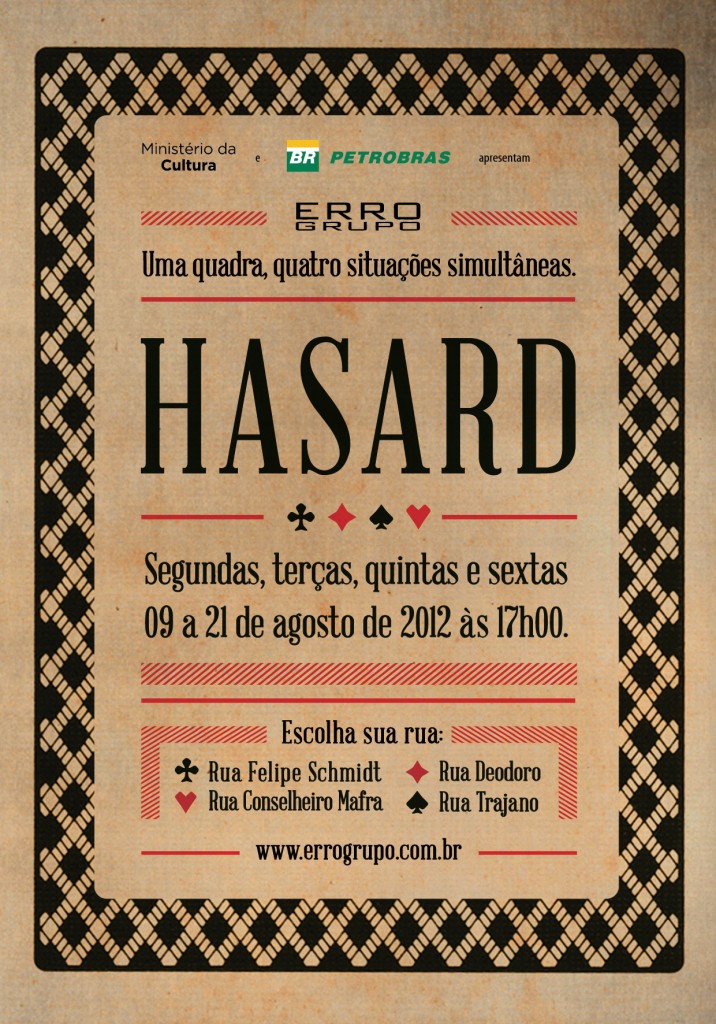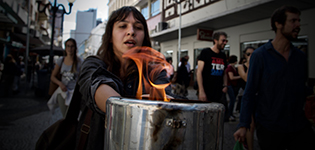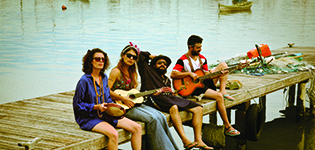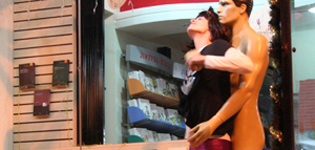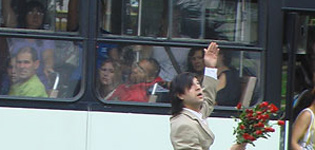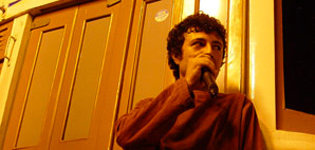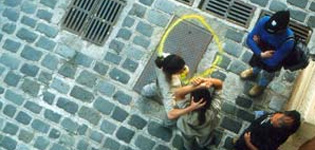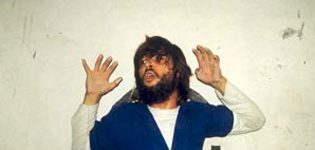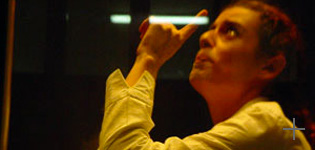Obra
HASARD
Quatro ruas. Quatro situações. Escolha a sua posição.
Em HASARD quatro situações contaminam umas às outras, utilizando a aleatoriedade como operação, possibilitando diferentes desdobramentos das ações, através das diferentes formas de jogo que o grupo propõe aos transeuntes durante a intervenção. As ações percorrem todo um quarteirão e o público terá sempre que se posicionar para acompanhar os desenlaces das tramas propostas.
(ENGLSH BELOW)
HASARD (2012)
Editado em dezembro de 2012, este vídeo é o registro do processo de ensaios e apresentações de HASARD, em Florianópolis, Biguaçu, São José, Porto Alegre e São Paulo, ao longo desse ano.
HASARD surgiu da pesquisa do ERRO Grupo, pelo Programa Petrobras Cultural, sobre a relação de jogos na sociedade contemporânea — assunto explorado em outros trabalhos do grupo e aprofundado nessa obra sob a ótica dos jogos financeiros e de retenção de poder. O trabalho se desenvolve sob a tríade: mercado, manutenção do poder e jogos de azar, em uma miríade de caminhos e proposições que exploram a situação de perda à luz do controle e das leis do mercado em nosso cotidiano.
ORIGEM DO JOGO
A palavra azzahr denominava o jogo e os ossos em cubos numerados de um dos primeiros jogos conhecidos na história da humanidade. Os árabes jogavam azzahr durante o comércio com os europeus na Idade Média e na época disseminaram esse jogo de dados. Os franceses o chamaram de hasar ou hasard, significando aleatoriedade, chance, acaso, possibilidade de perda ou dano e risco, sendo registrado pela primeira vez como o sentido do verbo ‘colocar algo em jogo’, no caso, no jogo de azar. Durante as guerras entre a França e a Inglaterra nos séc. XIII e XIV, os ingleses aprenderam o jogo e o chamaram de hazard, significando ‘tirar a sorte ou o azar’, além dos significados atuais: ‘ameaça’, ‘perigo’. Em árabe, azzahr, az-Zahr ou al-Zahr são os nomes da própria peça do jogo, o dado.
A PESQUISA
HASARD surgiu da pesquisa do ERRO Grupo, pelo Programa Petrobras Cultural, sobre a relação de jogos na sociedade contemporânea – assunto explorado em outros trabalhos do grupo e aprofundado nessa obra sob a ótica dos jogos financeiros e de retenção de poder. O trabalho se desenvolve sob a tríade mercado, manutenção do poder e jogos de azar, em uma miríade de caminhos e proposições que exploram a situação de perda à luz do controle e das leis do mercado em nosso cotidiano.
Ao pesquisar sobre a origem dos jogos, o grupo se deparou com o raciocínio de que todo jogo nasce da profanação de um rito ou mito religioso. O jogo ignora a separação entre humano e divino ou faz dela um uso particular, não se origina apenas de uma esfera do sagrado, mas como representa a sua inversão e subversão.
Qual seria o jogo sagrado da sociedade contemporânea? Com esta indagação, o ERRO Grupo se apoiou nas conclusões do filósofo Walter Benjamin, quando afirma que o capitalismo é uma religião e não apenas um sistema político. Uma religião pagã onde o utilitarismo ganha sua coloração religiosa. Investir, comprar, apostar, manobrar a bolsa de valores, vender, etc., são práticas utilitárias do culto ao capitalismo. O ineditismo histórico desta religião é não buscar a reforma, mas a ruína do ser. Como coloca o estudioso Michael Löwy, a nossa culpa é o nosso endividamento para com o capital, perpétua e crescente, nenhuma esperança é permitida. Segundo a religião do capital, a única salvação reside na intensificação do sistema, na expansão capitalista, no acúmulo de mercadorias, mas isso só agrava o nosso desespero.
Tendo em vista que a regra é a base para todo jogo, o grupo recorreu a informações sobre quem controla e faz valer as regras deste jogo capitalista, aqueles que detêm o poder de julgar e de manter a ordem. O jogo não pertence à vida comum, se situa fora do mecanismo de satisfação imediata das necessidades e dos desejos e, pelo contrário, interrompe este mecanismo. Ele se insinua como atividade temporária, que tem uma finalidade autônoma e se realiza tendo em vista uma satisfação que consiste nessa própria realização e se apresenta como um intervalo em nossa vida cotidiana. O jogo ornamenta a vida, ampliando-a, e torna-se uma necessidade tanto para o indivíduo, como função vital, quanto para a sociedade, devido ao sentido que encerra à sua significação, seu valor expressivo, suas associações espirituais e sociais, em resumo, como função cultural, ao domínio do ritual, do culto e do sagrado.
Roger Caillois, teórico do jogo, estabeleceu categorias claras que dão conta das modalidades do ato de jogar, essas categorias estão representadas em HASARD na forma de quatro situações simultâneas em quatro ruas diferentes de um quarteirão. A competição (agon), a encenação ou simulacro (mimicry), o azar (alea) e a vertigem (ilinx), tais categorias podem combinar-se em face da complexidade do jogo.
Sobre a dramaturgia da peça, a atriz e dramaturga Luana Raiter afirma que “um dos objetivos do HASARD é expandir a arte para além de sua posição convencional, elitizada, intocável, comercial para apresentá-la como algo em movimento, como um jogo, e fazer de nossos rituais cotidianos espaços criativos e transformadores no espaço urbano”. O diretor e também dramaturgo Pedro Bennaton complementa: “A dramaturgia de HASARD não só é fragmentada como se propõe fragmentar, dividir o público. Ainda estamos explorando esse aspecto, e continuaremos durante a temporada, pois é o primeiro trabalho no qual dividimos as pessoas em múltiplos espaços de forma tão radical”, ressalta.
PROJETO MANUTENÇÃO DO ERRO
O ERRO Grupo, através do Programa Petrobras Cultural com o patrocínio da Petrobras, iniciou o projeto Manutenção do ERRO, em outubro de 2010 e o desenvolverá até novembro de 2012, nas cidades de Florianópolis e região, Porto Alegre e São Paulo. O objetivo do Petrobras Cultural é contemplar grupos de teatro dedicados à produção cênica contemporânea, com o patrocínio às ações continuadas de pesquisa, produção e difusão de seus trabalhos.
O projeto Manutenção do ERRO é dividido em duas etapas ao longo destes dois anos. Só em 2011, foram 33 apresentações na Grande Florianópolis com mostras do repertório do grupo, totalizando 25 mil espectadores, através das temporadas que o ERRO realizou dos espetáculos do repertório do grupo: Adelaide Fontana, Buzkashi, Escaparate, Desvio, Carga Viva, e Enfim um Líder, as oficinas Aberta ao ERRO, realizadas em 2010 e 2011, a oficina com o diretor argentino Emílio Garcia Wehbi, o intercâmbio artístico do ERRO com o Grupo Empreza/GO, assim como conversas com os profissionais convidados realizadas na sede do grupo e na Fundação Franklin Cascaes gratuitas e abertas ao público, e que se complementam nesse ano com as pesquisas e temporadas de HASARD, somando 55 apresentações em dois anos e cinco oficinas formativas.
PETROBRAS CULTURAL
O Projeto Manutenção do ERRO é um dos projetos selecionados pelo Programa Petrobras Cultural que é destinado à seleção pública de projetos em 19 áreas culturais, dentro das três linhas de atuação: Formação; Preservação e Memória; e Produção e Difusão. Criado em 2003, o PPC baliza as ações de patrocínio da Petrobras em torno de uma política cultural de alcance social e de afirmação da identidade brasileira. Desde sua primeira edição, as seleções públicas já destinaram R$ 250 milhões a mais de mil projetos em todos os estados do país através da Lei Rouanet. Obtenha mais informações em http://www.hotsitespetrobras.com.br/ppc/.
HASARD
Ficha Técnica
Concepção e dramaturgia: Luana Raiter e Pedro Bennaton
Direção: Pedro Bennaton
Atores: Luana Raiter, Luiz Henrique Cudo, Michel Marques e Sarah Ferreira
Performers: Rodrigo Ramos, Dilmo Nunes, Robison Soletti e Crica Gadotti
Direção de Arte: ERRO Grupo
Sonoplastia: Isaac Varzim
Técnicos de som e vídeo: Michel Marques, Rodrigo Ramos e Robison Soletti
Cenotécnica: Crica Gadotti
Contra-regra: Ângelo Giotto
Design-gráfico: Fabrício Faustin Rezende e Rafael Amaral
Baralho: Leandro Pitz
Textos baralho: Luana Raiter e Pedro Bennaton
Fotografia: Larissa Nowak, Ana Carolina Von Hertwig, Pedro Bennaton e Rafael Schlichting
Filmagem: Rafael Schlichting, Ana Carolina Von Hertwig, Pedro Bennaton e Sarah Ferreira
Edição de vídeo: Rafael Schlichting e Sarah Ferreira
Assessoria de imprensa: Juliana Bassetti
Web-designer: Henrique Palazzo – Estúdio Obra
Contabilidade: Cultura Contábil
Criação, realização e produção: ERRO Grupo
Four streets. Four situations. Choose your position.In HASARD, four situations contaminate each other, using randomness as an operation, allowing different actions to unfold through the different forms of game that the group proposes to passers-by during the intervention. The actions make a path thru out a whole block and the public will always have to position itself to follow the outcomes of the proposed plots.
Edited in December 2012, this video is records HASARD´s rehearsals and presentations process, in Florianópolis, Biguaçu, São José, Porto Alegre and São Paulo, during that year. HASARD emerged from the ERRO Grupo’s research, sponsored by Programa Petrobas Cultural, on the relation of games in contemporary society – a subject explored in other works of the group and deepened in this work from the perspective of financial games and retention of power. The work develops under the triad: market, maintenance of power and games of chance, in a myriad of ways and propositions that exploit the situation of loss in the light of control and the laws of the market in our daily life.
ORIGIN OF THE GAME
The word azzahr refers to the game played with numbered bones sculpted in cubes in one of the first known games in the history of humanity. The Arabs played azzahr during trade with the Europeans in the Middle Ages and in that period, disseminated the game of dices. The French have called it hasar or hasard, meaning randomness, chance, chance being, the possibility of loss or damage and risk, being first recorded as the meaning of the verb ‘put something into play’, in this case, in a game of chance.
During the wars between France and England in the 18th century, XIII and XIV, the English learned the game and called it a hazard, meaning ‘to take luck or chance’, in addition to the current meanings: ‘threat’, ‘danger’. In Arabic, azzahr, az-Zahr or al-Zahr are the names of the game pieces itself, the dices.
THE RESEARCH
When researching on the origin of games, the group was faced with the reasoning that every game arises from the desecration of a religious rite or myth. The game ignores the separation between human and divine or makes of it a particular use; it is not only originated from a sacred sphere, but is it also represents its inversion and subversion. What would be contemporary society sacred game?
With this inquiry, ERRO Grupo relied on the conclusions of the philosopher Walter Benjamin, when he affirms that capitalism is a religion and not just a political system. A pagan religion where utilitarianism gains its religious coloring. Investing, buying, betting, maneuvering the stock exchange, selling, etc., are utilitarian practices of the cult to capitalism. The historical debut of this religion is not to seek reform, but the ruin of the being. As the scholar Michael Löwy puts it, our fault is our indebtedness to capital, that its perpetual and growing, and here, no hope is allowed.
According to the religion of capital, the only salvation lies in the intensification of the system, in the capitalist expansion, in the accumulation of commodities, but this only exacerbates our despair. Given that the rule is the basis for every game, the group tried to sketch out information on who controls and enforces the rules of this capitalist game, those who hold the power to judge and maintain the order. The game does not belong to common life, it is outside the mechanism of immediate satisfaction of needs and desires and, on the contrary, it interrupts this mechanism. It insinuates itself as a temporary activity, which has an autonomous purpose and is realized in view of satisfaction that consists in this very realization and presents itself as an break in our daily life.
The game adorns life, enlarging it, and becomes a necessity both for the individual, as a vital function, and for society, because it enclosures de significance it contains to its own meaning, its expressive value, its spiritual and social associations, in as a cultural function, to the domain of ritual, worship and the of the sacred. Game’s theoretician Roger Caillois, established clear categories that account for the modalities of the act of playing, these categories are represented in HASARD in the form of four simultaneous situations in four different streets of a block. Competition (agon), staging (mimicry), chance (alea) and vertigo (ilinx), such categories can be combined in the face of the complexity of the game.
The dramaturgy of the play, the actress and playwright Luana Raiter states that “one of HASARD’s goals is to expand art beyond its conventional, elitist, untouchable, commercial position to present it as something in motion, as a game, and make our daily rituals creative and transforming spaces in urban space”. The director and also playwright Pedro Bennaton completes: “The dramaturgy of HASARD is not only fragmented as it is proposed to fragment, divide the public. We are still exploring this, and we will continue during the season, because it is the first work in which we divide people in multiple spaces so radically “he points out.
PROJECT MANUTENÇÃO DO ERRO
ERRO Grupo, through the Programa Petrobras Cultural, sponsored by Petrobras, started MANUTENÇÃO DO ERRO in October 2010 and will develop it until November 2012 in the cities of Florianópolis and region, Porto Alegre and São Paulo. The objective of Petrobras Cultural is to contemplate theater groups dedicated to contemporary scenic production, with the sponsorship of continuous research, production and diffusion of their works.
The project MANUTENÇÃO DO ERRO is divided into two phases over the course of these two years. In 2011 we made 33 presentations in the Grande Florianópolis with shows from the repertoire of the group, reaching a total of 25 thousand spectators, through the seasons that the ERRO realized of the spectacles of the group´s repertoire: Adelaide Fontana, Buzkashi, Escaparate, Desvio, Carga Viva, and finally the ERRO workshops, held in 2010 and 2011, the workshop with Argentine director Emilio Garcia Wehbi, with an artistic exchange with Grupo Empreza / GO, as well as conversations with invited professionals held at the group’s space and in the Franklin Cascaes Foundation, which were all free and open to the public, and complement that year with HASARD’s researches and seasons, with 55 presentations in two years and five training workshops.
PETROBRAS CULTURALThe project MANUTENÇÃO DO ERRO Maintenance Project is one of the projects selected by the Petrobras Cultural Program that is destined to the public selection of projects in 19 cultural areas, within the three lines of action: Training; Preservation and Memory; and Production and Diffusion. Created in 2003, the PPC targets to sponsorship actions of Petrobras around a cultural policy of social reach and affirmation of the Brazilian identity. Since its first edition, public selections have already allocated R$ 250 million to more than one thousand projects in all the states of the country through the Rouanet Law. Get more information at http://www.hotsitespetrobras.com.br/ppc/.
HASARD
Credits
Conception and dramaturgy: Luana Raiter and Pedro Bennaton
Direction: Pedro Bennaton
Actors: Luana Raiter, Luiz Henrique Cudo, Michel Marques and Sarah Ferreira
Performers: Rodrigo Ramos, Dilmo Nunes, Robison Soletti and Crica Gadotti
Art Direction: ERRO Grupo
Sound designer: Isaac Varzim
Sound and video technicians: Michel Marques, Rodrigo Ramos and Robison Soletti
Escenery technician: Crica Gadotti
Counter-rule: Ângelo Giotto
Graphic Design: Fabrício Faustin Rezende and Rafael Amaral
Cards art: Leandro Pitz
Texts: Luana Raiter and Pedro Bennaton
Photography: Larissa Nowak, Ana Carolina Von Hertwig, Pedro Bennaton and Rafael Schlichting
Filming: Rafael Schlichting, Ana Carolina Von Hertwig, Pedro Bennaton and Sarah Ferreira
Video editing: Rafael Schlichting and Sarah Ferreira
Press Assistant: Juliana Bassetti
Web-designer: Henrique Palazzo – Studio Work
Accounting: Accounting Culture
Creation, production and production: ERRO Grupo



